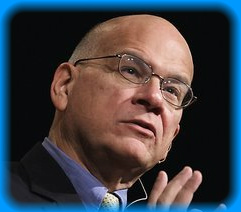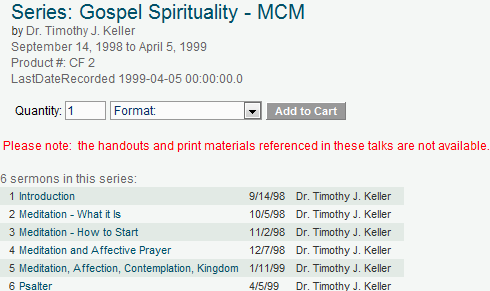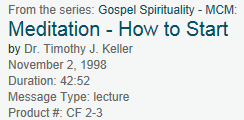TIM KELLER ON GREATEST NAMES IN PRAYING AND SPIRITUALITY
By Ken Silva pastor-teacher on Sep 16, 2011 in AM Missives, Contemplative Spirituality/Mysticism, Current Issues, Features
 Even though it costs, with donations now nearing a critical low, which threatens our future, the online apologetics and discernment work Apprising Ministries still continues to warn you that there is a tsunami of apostasy—pushed along by 1 Peter 4:17 judgments—headed toward the church visible.
Even though it costs, with donations now nearing a critical low, which threatens our future, the online apologetics and discernment work Apprising Ministries still continues to warn you that there is a tsunami of apostasy—pushed along by 1 Peter 4:17 judgments—headed toward the church visible.
In this follow-up to Tim Keller And Contemplative Spirituality I’ll give you reason to be concerned about the corrupt Contemplative Spirituality/Mysticism (CSM) ala the Living Spiritual Teacher and Quaker mystic Richard Foster and his spiritual twin, Southern Baptist minister Dallas Willard, slithering around—even within the young, restless, and reformed camp.
As another illustration of how—at best—prolonged practice of spurious CSM always ends up blurring doctrinal lines and—at worst—even ends up attacking the Gospel itself I present the following from Gospel Coalition Council member Dr. Tim Keller.
I’m a former Roman Catholic, whom God in His mercy saved from that bondage, as well as one who has extensively studied CSM as part of my coverage of the neo-liberal cult operating within the Emerging Church. Being that it’s a core doctrine of this group, just look where it’s led them.
For me, here I will respectfully offer that Dr. Keller’s absolute involvement with CSM would actually be a major contributing factor as to what happened recently in Tim Keller On Whether Or Not Muslims, Sikhs, Hindus And Jews Are Saved After Death.
What follows is from a series of sermons by Dr. Keller called Gospel Spirituality-MCM at his Redeemer Presbyterian Church (RPC) beginning on September 14, 1998:
You will also see in Tim Keller And Contemplative Spirituality that, in addition to recommending and using the work of pastrix Adele Calhoun, Dr. Keller is not only talking about proper Biblical meditation:
we’ve got at least two other streams of that are filled with good, helpful material on meditation – the Catholic stream and the Quaker stream that are not primarily based on meditating on the Scripture. There are a number of reasons why.
But just to give you an example, I read a book by a Quaker—ah actually the book is great, except for one part. Some of you have heard of him. His name is Richard Foster. He wrote the book called Celebration of Discipline. [1]
Dr. Keller also tells us that Foster has written another “book called Meditative Prayer and it’s very typical of the Quaker tradition.” I have it; and it is filled with mystics and something close to astral projection.
Suffice to say Richard Foster is a fanatical fool, who eschews sola Scriptura in favor of highly subjective encounters he has through his practice of CSM. Foster calls them:
experiences of beholding that go deeper than human words can express…often there are inward yearnings and aspirations that cannot quite be caught in human language.
At times the gift of tongues, or glossolalia, becomes a channel through which the spirit may behold the Holy One of Israel. At other times one experiences what St. Teresa of Avila called “the prayer of quiet,’ where all words become superfluous.
In silence [of meditation] we behold the Lord, for words are not needed for there to be communion… Father James Borst said, “He is closer to my true self than I am myself.” [2]
Just so you know, this so-called “true self” is actually a denial of the doctrine of original sin as you can see below when Thomas Merton, a real Golden Buddha of CSM, tells us what mystic mythology believes it to be:
the center of our being is a point of nothingness which is untouched by sin and by illusion, a point of pure truth. [3]
Making it clear that he is referring to more than just meditating upon Scripture, Dr. Keller tells us:
The best things that have been written almost are by Catholics during the counter Reformation—Ignatius Loyola, Francis de Sales, John of the Cross, St. Teresa of Avila—great stuff.[4]
This “great stuff” of which Dr. Keller speaks is all written by mystics who reject the proper Christian spirituality of sola Scriptura, and instead, advocate Contemplative/Centering Prayer (CCP); transcendental meditation in an altered state of consciousness.
What you’re about to see is transcribed:
Dr. Keller teaches the leadership of his RPC:
Now let me give you a {Roman] Catholic approach [to meditation]. Now what I call a [Roman] Catholic approach is, is, around the time of the Reformation—partly, I mean—if you a church historian, or a [Roman] Catholic, or a Protestant, I’m sure what I’m about to say sounds like an over-simplification. Of course it is; it wouldn’t be interesting if it wasn’t.
Ah, The Protestants started to really, become successful and the [Roman] Catholics said, “Why are they so successful?” And they looked and they realized, because the Protestants had really taken religion back to the individual—and said, “you can have a personal relationship with God.” In a way the [Roman] Catholic Church had not given them.
Again, with all due respect for Dr. Tim Keller, the Roman Catholic Church thought, “the Protestants had really taken religion back to the individual”? They had “become successful”? What does that sentence even mean?
To me this moves well beyond mere “over-simplification” into appearing to show a very serious misunderstanding of what the Protestant Reformation was actually about. Consider the following from Dr. R.C. Sproul:
The Roman Catholic Church condemns “sola fide! (L.)” Now if, please understand this, if “sola fide (L.)” is the gospel, then the Roman Catholic Church has condemned the gospel of Jesus Christ. Now, nobody who went to the Council of Trent, as a delegate, went there with the intention of condemning the gospel.
The theologians of Rome really believed that they were defending the gospel and that the Protestants had in fact committed apostasy. And I admire the Church, the Roman communion of the 16th century for at least understanding what apparently people don’t understand today, and that is what is at stake here.
That they understood that somebody is under the anathema of God! And we can be as nice, and as pleasant, and as gentle, and as loving, and as charitable, and tolerant as we can possibly be, but it’s not going to change that folks. Somebody is preaching a different gospel!
And when Rome condemned the Protestant declaration of “Justification by faith alone” I believe, Rome, when placing the anathema on “sola fide (L.),” placed the anathema of God upon themselves. I agree with his [John MacArthur] assessment, that the institution [Roman Catholic Church] is apostate! (Online source)
We’re not talking about mere “success” in this arena; no, we’re talking about the very Gospel of Jesus Christ itself. Dr. Keller continues:
So, in the Counter Reformation, right after the time of ah Luther and Calvin, ah, was a flourishing of Catholic spirituality. And so many of the greatest names in, ah, praying and spirituality—ah, St. Teresa of Avila, John of the Cross, St Francis de Sales, Ignatius of Loyola all lived around the same time.
Now what I’ve given you here is actually not from any of those even though you can get some pretty good stuff from all of them. But there was a very famous and well known, because it—because it was so simple—was a tract on prayer and meditation and it was written by two guys Lewis de Granada and Peter Alcántara, I think I’m saying it right.
And this is a, this is a method that was very very close—it’s extremely close if you—to anything de Sales says or Loyola says. [5]
Once again, as gently and respectfully as I can, what Dr. Keller has just stated is quite problematic in a number of ways. In closing this, for now, let me just highlight a couple of things here.
First, the two men Dr. Keller tells us wrote the tract he referenced above were both staunch Roman Catholics living as the Protestant Reformation began and who also rejected the Gospel.
The Ven. Louis of Granada was, “Among the hundreds of eminent ascetical writers of Spain” [6]; and the Roman Catholic online encyclopedia tells us that St. Peter of Alcántara was:
a Franciscan in the convent of the Stricter Observance at Manxaretes… He was ordained priest in 1524, and the following year made guardian of the convent of St. Mary of the Angels at Robredillo…he joined Father Martin a Santa Maria in his life of eremitical solitude…
Returning to Spain in 1553 he spent two more years in solitude, and then journeyed barefoot to Rome,… Not discouraged by the opposition and ill-success his efforts at reform [of the Roman Catholic Church] had met with in St. Gabriel’s province, Peter drew up the constitutions of the new province with even greater severity…
In St. Teresa [of Avila], Peter perceived a soul chosen of God for a great work, and her success in the reform of Carmel was in great measure due to his counsel, encouragement, and defence…the most remarkable of Peter’s graces [was] his gift of contemplation [means contemplative spirituality]… (Online source)
So Dr. Keller is right when he says they were as much Roman Catholic mystics as the others whom he tells us are among “the greatest names in praying and spirituality.” I think we need to ask a few serious questions here.
If these Roman Catholic mystics were really such spiritual giants, why then did they reject God’s only Gospel? Why would the Christian wish to learn their spiritual practices, which led them away from the Gospel?
And I think the critical question becomes: Is the Gospel Coalition really ok with this?
________________________________________________________________________________
End notes:
Back to note 1 — Dr. Tim Keller, Meditation What it is, 23:27-23:57.
Back to note 2 — Richard Foster, Meditative Prayer [Downers Grove: InterVarsity Press, 1983], 19, 20.
Back to note 3 — Thomas Merton, Conjectures of a Guilty Bystander [New York: Doubleday, 1966] , 158.
Back to note 4 — Keller, Meditation, op. cit.
Back to note 5 — Dr. Tim Keller, Meditation – How to Start, 17:58-19:22.
Back to note 6 — http://www.newadvent.org/cathen/09385b.htm, accessed 9/16/11.
See also:
MARTIN LUTHER WITH THE REFORMATION VIEW OF ROMAN CATHOLICISM
JOHN PIPER, RICK WARREN & FOSTER-WILLARDISM
“CELEBRATION OF DISCIPLINE” BY RICHARD FOSTER AN ENCYCLOPEDIA OF THEOLOGICAL ERROR

